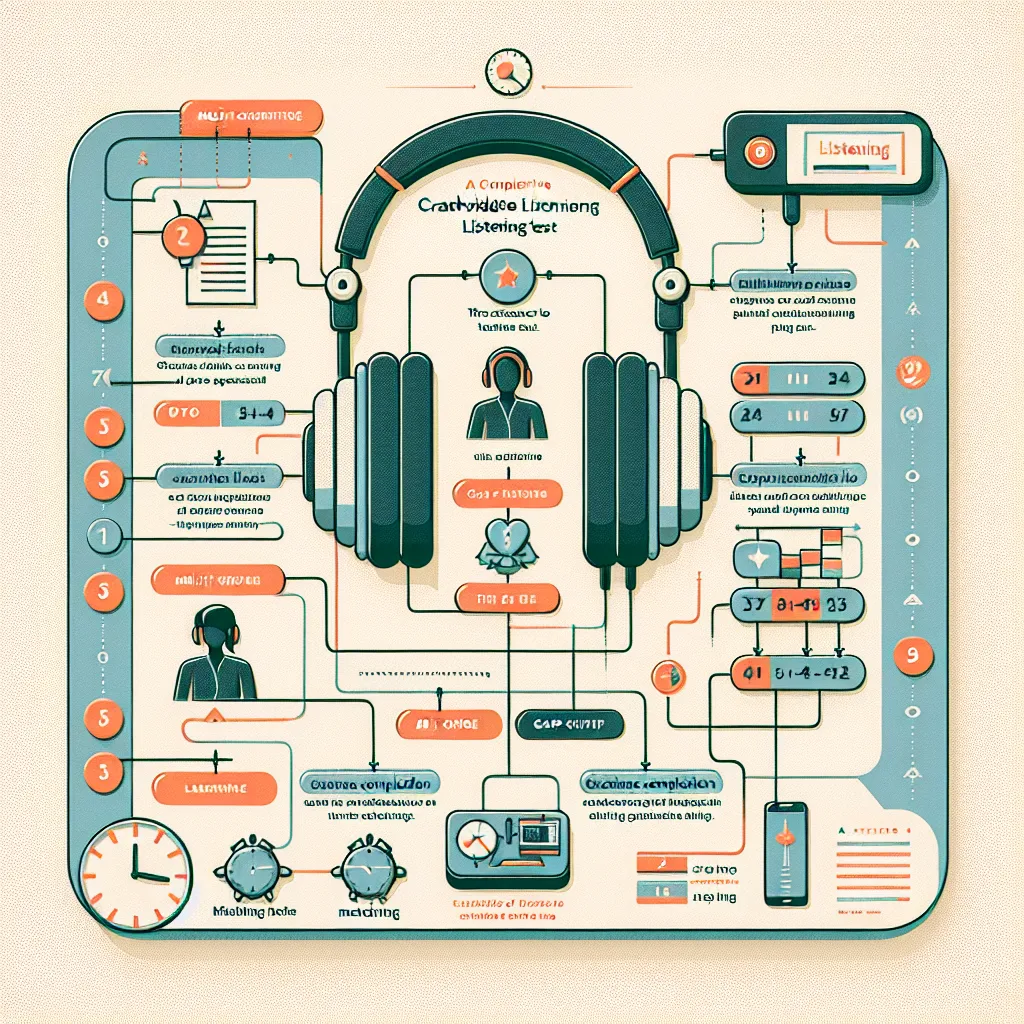Are you preparing for the Cambridge Listening test? Whether you’re taking the IELTS, Cambridge English Qualifications, or any other Cambridge exam, the listening component can be challenging. In this comprehensive guide, we’ll explore common mistakes made by test-takers and provide valuable tips to help you avoid them. By understanding these pitfalls, you’ll be better equipped to ace your Cambridge Listening test.
Understanding the Cambridge Listening Test
Before we dive into the common mistakes, let’s briefly review what the Cambridge Listening test entails. This component assesses your ability to understand spoken English in various contexts, including academic discussions, everyday conversations, and lectures. The test typically consists of four sections, each with increasing difficulty, and lasts about 30-40 minutes.
 Cambridge Listening Test Overview
Cambridge Listening Test Overview
Common Mistakes in the Cambridge Listening Test
1. Not Reading the Questions Beforehand
One of the most frequent mistakes test-takers make is failing to read the questions before the audio begins. This oversight can lead to confusion and missed information.
Why it’s a problem: The Cambridge Listening test gives you time to review questions before each section starts. If you don’t use this time effectively, you may struggle to focus on the relevant information when the audio plays.
How to avoid it: Always use the given time to read through the questions carefully. Underline key words and predict the type of information you’ll need to listen for.
2. Misinterpreting the Question Types
The Cambridge Listening test includes various question formats, such as multiple choice, gap-filling, and matching. Misunderstanding these formats can lead to incorrect answers.
Why it’s a problem: Each question type requires a different approach. If you’re not familiar with the format, you might misinterpret what’s being asked or how to respond.
How to avoid it: Practice with a variety of question types before the test. Familiarize yourself with the instructions for each format and how to record your answers correctly.
3. Failing to Follow the Word Limit
Some questions in the listening test require you to write a short answer. Many test-takers lose marks by exceeding the specified word limit.
Why it’s a problem: Answers that exceed the word limit are marked as incorrect, even if the content is accurate.
How to avoid it: Always adhere to the word limit stated in the instructions. Practice writing concise answers that capture the essential information within the given limit.
4. Getting Distracted by Unfamiliar Words
It’s common to encounter unfamiliar vocabulary during the listening test. However, fixating on these words can cause you to miss important information.
Why it’s a problem: If you spend too much time trying to understand an unfamiliar word, you may miss the next few sentences of the audio, potentially losing valuable information.
How to avoid it: Focus on understanding the overall context rather than individual words. If you encounter an unfamiliar term, make your best guess and move on. Often, the surrounding context will provide enough information to answer the question correctly.
5. Not Managing Time Effectively
Poor time management can lead to rushed answers or incomplete sections.
Why it’s a problem: The Cambridge Listening test is timed, and you need to balance listening, comprehending, and recording your answers efficiently.
How to avoid it: Practice with timed mock tests to improve your pacing. Learn to quickly scan questions and write answers concisely. Remember, you’ll have some time at the end to transfer your answers to the answer sheet.
6. Spelling and Grammar Errors
While the listening test primarily assesses your comprehension skills, spelling and grammar mistakes can cost you points.
Why it’s a problem: In questions requiring written answers, incorrect spelling or grammar can result in lost marks, even if you’ve understood the audio correctly.
How to avoid it: Pay attention to spelling, especially for names, numbers, and technical terms. Practice your spelling of common words that often appear in listening tests. Be mindful of singular/plural forms and verb tenses in your answers.
 Common Spelling and Grammar Mistakes
Common Spelling and Grammar Mistakes
7. Panicking When You Miss Information
It’s easy to feel flustered if you miss a piece of information or an entire answer. This panic can affect your performance on subsequent questions.
Why it’s a problem: Dwelling on a missed answer can distract you from focusing on the current question, potentially causing you to miss even more information.
How to avoid it: Stay calm and move on if you miss an answer. Remember, each question is independent, and you can still perform well overall even if you miss one or two answers.
8. Not Using the Example Questions Effectively
At the beginning of each section, there’s usually an example question. Many test-takers overlook this valuable resource.
Why it’s a problem: The example provides insight into the type of questions and answers to expect in that section. Ignoring it means missing out on helpful cues.
How to avoid it: Always pay attention to the example questions. They can give you a better understanding of what to listen for and how to format your answers.
9. Mishearing Similar Sounds
English has many words that sound similar but have different meanings. Mistaking these can lead to incorrect answers.
Why it’s a problem: The listening test often includes tricky pairs of words to test your ability to distinguish between similar sounds.
How to avoid it: Practice listening to minimal pairs (words that differ by only one sound) and work on your phonetic awareness. Pay close attention to context, which can often clarify which word is being used.
10. Not Adapting to Different Accents
The Cambridge Listening test includes a variety of English accents, which can be challenging for some test-takers.
Why it’s a problem: If you’re not accustomed to different accents, you might misunderstand or miss crucial information.
How to avoid it: Expose yourself to a wide range of English accents through podcasts, news broadcasts, and TV shows from different English-speaking countries. This will help you become more comfortable with various pronunciations and intonations.
Next Steps for Improving Your Listening Skills
Now that you’re aware of these common mistakes, it’s time to put your knowledge into practice. Here are some steps you can take to enhance your performance in the Cambridge Listening test:
-
Regular Practice: Use official Cambridge practice tests to familiarize yourself with the format and timing.
-
Diverse Listening Materials: Expand your listening practice beyond test materials. Include podcasts, TED talks, and academic lectures in your study routine.
-
Focused Skill Development: Work on specific areas such as note-taking, summarizing, and identifying main ideas in spoken English.
-
Timed Mock Tests: Regularly take full-length, timed practice tests to improve your pacing and stamina.
-
Review and Reflect: After each practice session, review your mistakes and reflect on areas for improvement.
Conclusion
Avoiding these Common Mistakes In The Cambridge Listening Test can significantly improve your score and boost your confidence. Remember, successful listening is not just about hearing words; it’s about understanding context, managing your time effectively, and staying focused throughout the test. With consistent practice and awareness of these potential pitfalls, you’ll be well-prepared to tackle the listening component of your Cambridge exam.
We encourage you to share your experiences or ask questions in the comments below. Good luck with your preparation, and don’t forget to check out our other articles on Cambridge exam strategies!
[internal_links]




